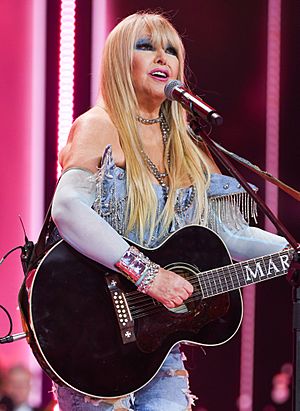Maryla Rodowicz facts for kids
Quick facts for kids
Maryla Rodowicz
|
|
|---|---|

Rodowicz in 2023
|
|
| Born |
Maria Antonina Rodowicz
8 December 1945 Zielona Góra, Poland
|
| Occupation |
|
| Years active | 1962–present |
| Musical career | |
| Genres |
|
| Instruments | Acoustic guitar |
| Labels |
|
| Associated acts |
|
| Signature | |
Maryla Rodowicz (born Maria Antonina Rodowicz on December 8, 1945) is a famous Polish singer, guitarist, and actress. She is one of the most successful and popular singers in the history of Polish music.
For over 60 years, she has recorded more than 20 albums in Polish and four in other languages. Many of her albums have become gold or platinum, meaning they sold a very large number of copies. Some of her most famous songs include "Małgośka," "Futbol," and "Niech żyje bal."
For her contributions to culture, she has received important awards in Poland, such as the Gold Cross of Merit and the Gold Medal for Merit to Culture – Gloria Artis.
Contents
Early Life and Education
Maryla Rodowicz was born in Zielona Góra, Poland. Her family was originally from Vilnius (now in Lithuania). Before World War II, her father was a professor at a university in Vilnius.
She went to high school in the city of Włocławek. In her youth, she was very active in athletics. Later, she graduated from the Academy of Physical Education in Warsaw.
Music Career
How It All Started
Maryla Rodowicz's career took off in 1967 when she won first prize at a student song festival in Kraków. Two years later, she recorded her first hit song, "Mówiły mu" ("The girls told him"). Her first full album was released in 1970.
In 1973, her song "Małgośka," with lyrics by the famous writer Agnieszka Osiecka, became a huge success. The next year, she performed her song "Futbol" ("Football") at the opening ceremony of the FIFA World Cup in Munich, Germany.
A Star in Poland and Abroad
Over her long career, Rodowicz has recorded more than 600 songs. She has released albums in Polish, English, Czech, German, and Russian.
Besides "Małgośka," some of her other classic hits are:
- "Niech żyje bal" ("Long Live the Ball")
- "To już było" ("Done That")
- "Wielka Woda" ("Great Water")
- "Łatwopalni" ("Inflammables")
She has performed concerts all over the world, including in Europe, America, Australia, and Asia. She has also won many awards at music festivals in Poland and other countries.
Acting and Television
Rodowicz is also an actress. She has appeared in several movies and TV shows. For many years, she acted in the popular Polish TV series Rodzina zastępcza (Foster Family).
In 2021, she became a coach on the Polish version of the TV show The Voice Senior. That same year, a documentary film about her life and career, called Maryla. Tak kochałam, was shown on Polish television.
Personal Life
Maryla Rodowicz has three children. Her son Jan and daughter Katarzyna are from her relationship with director Krzysztof Jasiński. She also has a son named Jędrzej with her former husband, Andrzej Dużyński.
Selected Discography
Maryla Rodowicz has released many albums. Here are some of her most well-known ones:
- Żyj mój świecie (1970) - Her first album, which went Gold.
- Rok (1974) - Features the hit song "Małgośka".
- Sing-Sing (1976)
- Wsiąść do pociągu (1978) - Another Gold album.
- Polska Madonna (1987)
- Kochać (2005) - This album went Platinum.
- Jest cudnie (2008) - Also a Platinum album.
- Buty 2 (2011) - Another Platinum album.
- Ach świecie (2017)
See also
 In Spanish: Maryla Rodowicz para niños
In Spanish: Maryla Rodowicz para niños
- Music of Poland
- List of Polish music artists
Images for kids
 | Mary Eliza Mahoney |
 | Susie King Taylor |
 | Ida Gray |
 | Eliza Ann Grier |


